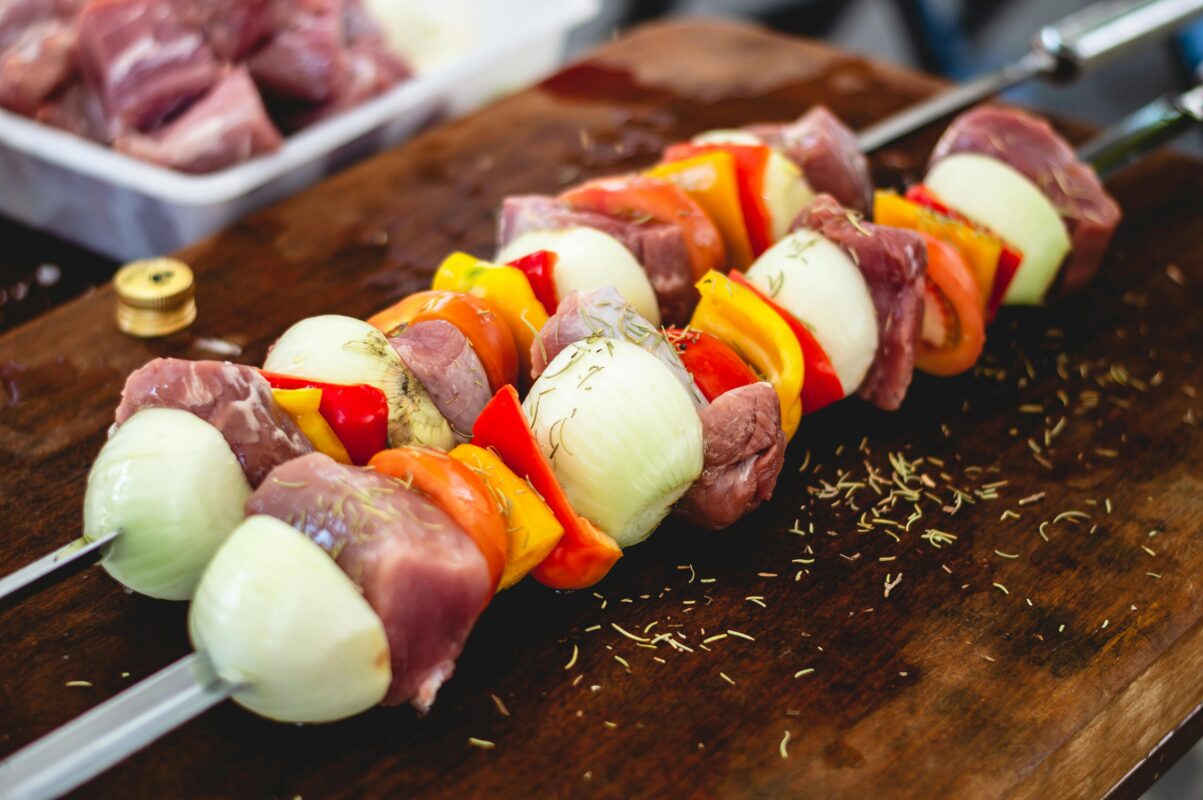Japanese barbecue sauce, known as “tare,” is an essential component of Japanese cuisine. Unlike the smoky, tangy sauces commonly associated with Western barbecue, Japanese barbecue sauce is often characterized by a delicate balance of savory, sweet, and umami flavors. It is typically used as a marinade, glaze, or dipping sauce for grilled meats and vegetables.
The main ingredients of this sauce, such as soy sauce, mirin, and sesame oil, provide a rich, deep flavor profile that complements a variety of dishes. In Japan, it’s used extensively for yakiniku (Japanese BBQ), where various cuts of meat, vegetables, and seafood are grilled over an open flame. The sauce adds a layer of complexity, enhancing the flavors of the grilled ingredients.
In this section, we will explore the ingredients, preparation, and ways to use Japanese barbecue sauce to elevate your grilling experience.
Key Ingredients in Japanese Barbecue Sauce

The foundation of any great Japanese BBQ sauce is its carefully selected ingredients. Each ingredient plays a crucial role in achieving the perfect balance of flavor. Here are the primary components that make up a traditional Japanese barbecue sauce:
- Soy Sauce: The base of the sauce, providing a salty, savory umami flavor. Dark soy sauce is often preferred for a richer taste.
- Mirin: A sweet rice wine that adds sweetness and depth to the sauce.
- Sugar or Honey: Sweeteners used to balance the salty components and add a touch of sweetness.
- Sesame Oil: A toasted sesame oil adds a nutty aroma and richness to the sauce.
- Ginger and Garlic: These aromatics contribute to the overall flavor and bring a hint of warmth and spice.
- Sake: Sometimes added for its mild acidity and slight sweetness, enhancing the sauce’s depth.
- Optional Add-ins: Some recipes include miso for a thicker consistency or fruit purees like apple or pear to add sweetness and freshness.
These ingredients work together to create a unique flavor profile, where the richness of soy sauce and the sweetness of mirin are harmonized with the warming qualities of garlic and ginger. The balance of these flavors is what distinguishes Japanese barbecue sauce from other sauces around the world.
Traditional vs. Modern Japanese Barbecue Sauce Variations
While the basic ingredients remain consistent, there are variations in Japanese BBQ sauce depending on the region and modern influences. Here’s a look at how traditional recipes differ from more contemporary takes:
Traditional Japanese Barbecue Sauce:
- Flavor Profile: Rich, savory, and slightly sweet, with a focus on umami.
- Use: Traditionally used in yakiniku (Japanese grilled meat) and other grilled dishes.
- Ingredients: Simple ingredients, often just soy sauce, mirin, garlic, ginger, and sesame oil.
Modern Japanese Barbecue Sauce:
- Innovative Additions: Modern recipes may include unique elements such as yuzu (a citrus fruit), chili paste, or even miso for a more robust and complex flavor.
- Customizations: Some chefs and home cooks add fruit purees like apple or pear for additional sweetness and fresh flavor.
- Fusion: Contemporary variations may combine flavors from other cuisines, such as Korean BBQ or even Western barbecue, to create exciting fusion sauces.
The adaptability of Japanese BBQ sauce has led to its evolution over time, allowing for more personalized flavors while still maintaining the essential umami character. Modern variations offer a playful twist on the traditional recipe, appealing to diverse tastes and palates.
Read More
Best Barbecue Recipe
How To Cook Chicken Tenderloins in Oven

Step-by-Step Recipe for Japanese Barbecue Sauce
Creating your own Japanese barbecue sauce at home is easy and rewarding. With just a few ingredients, you can make a rich, flavorful sauce that enhances grilled meats and vegetables. Follow this simple recipe to create your own Japanese barbecue sauce:
Ingredients:
- ½ cup soy sauce
- ¼ cup mirin
- 2 tablespoons sugar or honey
- 1 tablespoon sesame oil
- 1 clove garlic, minced
- 1 tablespoon fresh ginger, minced
- 2 tablespoons sake (optional)
- 1 teaspoon rice vinegar (optional for acidity)
Instructions:
- Combine Ingredients: In a small saucepan, combine the soy sauce, mirin, sugar, sesame oil, garlic, ginger, and sake (if using).
- Simmer: Bring the mixture to a gentle simmer over medium heat. Stir occasionally to dissolve the sugar.
- Reduce: Allow the sauce to simmer for about 5-10 minutes until it thickens slightly and the flavors meld together.
- Taste and Adjust: Taste the sauce and adjust the sweetness or saltiness by adding more sugar or soy sauce, depending on your preference.
- Cool and Store: Let the sauce cool completely before using. It can be stored in an airtight container in the refrigerator for up to a week.
This homemade Japanese BBQ sauce is perfect for grilling meats, vegetables, or even tofu. It can also be used as a marinade or a dipping sauce for a variety of dishes.
How to Use Japanese Barbecue Sauce
Japanese barbecue sauce is a versatile condiment that can be used in a variety of ways. Here are some of the most common uses for this delicious sauce:
- Marinade for Meat: Coat chicken, beef, pork, or lamb with the sauce and let it marinate for 30 minutes to an hour before grilling. This will infuse the meat with flavor and tenderness.
- Grill Glaze: Brush the sauce onto your meats and vegetables while grilling. The sauce will caramelize and form a flavorful glaze that adds depth and richness.
- Dipping Sauce: Serve Japanese barbecue sauce as a dip for grilled skewers, tempura, or vegetables. It’s also great for dipping sushi or rice balls.
- Topping for Tofu: If you’re grilling tofu or using it in stir-fries, drizzle the sauce over the top to add flavor and enhance its texture.
The versatility of Japanese barbecue sauce makes it an excellent addition to any meal, and its sweet, savory, and umami-packed flavor will elevate the taste of any grilled dish.
Tips for Perfecting Your Japanese Barbecue Sauce
To make the perfect Japanese barbecue sauce, attention to detail is essential. Here are some helpful tips to ensure that your sauce has the right balance of flavors and achieves that authentic taste:
- Use Quality Soy Sauce: The quality of soy sauce directly affects the flavor of the sauce. Opt for naturally brewed soy sauce for the best depth of umami.
- Adjust Sweetness: Depending on your preference, you can adjust the sweetness by adding more sugar or honey. Keep in mind that the sauce should not be overly sweet, so add it gradually.
- Control the Thickness: If you prefer a thicker sauce, allow it to simmer for longer. If you need a thinner consistency, you can add a small amount of water or broth.
- Use Fresh Aromatics: Fresh garlic and ginger give the sauce a sharper, more aromatic flavor. Avoid using garlic or ginger powder, as they can result in a less vibrant taste.
With these tips, you can fine-tune your Japanese BBQ sauce recipe to suit your preferences, ensuring that it perfectly complements your grilled meats, vegetables, or tofu.
Pairing Japanese Barbecue Sauce with Different Dishes
Japanese barbecue sauce is incredibly versatile and pairs well with a variety of dishes beyond traditional yakiniku. Here are some popular pairings for this flavorful sauce:
Grilled Meats:
Japanese barbecue sauce is perfect for glazing and marinating grilled meats. Whether you’re grilling chicken, beef, pork, or lamb, the savory and sweet notes of the sauce add depth to the grilled flavors.
For added richness, brush the sauce onto the meat during the final stages of grilling to create a caramelized glaze.
Grilled Vegetables:
This sauce isn’t limited to meat; it’s also delicious with grilled vegetables such as bell peppers, zucchini, eggplant, and mushrooms.
The sauce enhances the natural sweetness of the vegetables while adding a savory dimension.
Tofu and Tempeh:
For a plant-based option, Japanese BBQ sauce is fantastic with tofu or tempeh. Marinate or glaze the tofu to add flavor and a savory umami element, making it a satisfying dish for vegetarians and vegans alike.
Rice and Noodles:
You can even drizzle Japanese barbecue sauce over rice or noodles to add flavor. It pairs well with stir-fried dishes, enhancing the overall taste and bringing a delicious umami kick to your meal.

Variations of Japanese Barbecue Sauce
While the traditional Japanese barbecue sauce has a distinct flavor, it can also be customized to suit different preferences. Here are some variations you can try:
Spicy Japanese Barbecue Sauce:
Add a little heat by incorporating ingredients like chili paste or gochujang (Korean chili paste). This variation works particularly well for those who enjoy a spicy kick alongside the sweet and savory flavors.
Fruit-Infused Japanese Barbecue Sauce:
For a lighter, fruitier twist, try adding pureed fruits like apple, pear, or pineapple to the sauce. These fruits enhance the sweetness while adding an extra layer of freshness.
Miso-Based Japanese Barbecue Sauce:
For a richer, more complex flavor, consider adding miso paste to your barbecue sauce. This addition will create a thicker, umami-packed sauce that pairs wonderfully with grilled meats or vegetables.
These variations allow you to customize your Japanese BBQ sauce to suit your taste preferences and elevate your grilling experience.
Storing and Reusing Japanese Barbecue Sauce
Once you’ve made your homemade Japanese barbecue sauce, it’s important to know how to store it properly so it can be used for multiple meals.
Storage Tips:
- Refrigeration: Store the sauce in an airtight container in the refrigerator. It will typically last for up to a week, allowing you to enjoy it with several meals.
- Freezing: If you’ve made a large batch and won’t use it quickly, you can freeze the sauce in small portions for later use. Make sure to use freezer-safe containers or resealable bags.
- Reusing: If you’ve used the sauce as a marinade, discard any leftover sauce that has come into contact with raw meat. However, you can reuse it as a glaze or dipping sauce if it hasn’t been contaminated.
Knowing how to store and reuse barbecue sauce ensures that you’ll always have a flavorful addition to your grilled dishes.
Why Japanese Barbecue Sauce is Worth Making at Home
Making barbecue sauce at home offers several advantages over buying store-bought versions. Here’s why you should try making it from scratch:
- Customization: Homemade barbecue sauce allows you to adjust the flavors to your liking, whether you want it spicier, sweeter, or more savory.
- Freshness: When you make your own sauce, you control the freshness of the ingredients, which translates to a more vibrant flavor.
- No Preservatives: Homemade sauces contain no artificial preservatives or additives, ensuring a healthier alternative to store-bought varieties.
- Cost-Effective: Making Japanese sauce at home is often more affordable than purchasing pre-made sauces, especially if you already have the ingredients on hand.
By preparing your own Japanese barbecue sauce, you can enjoy a fresher, more personalized flavor that will take your grilling to the next level.
Conclusion
Japanese barbecue sauce is an incredibly versatile, flavorful condiment that can enhance the taste of a wide range of grilled dishes. With its balance of sweet, savory, and umami notes, this sauce is the perfect companion for meats, vegetables, tofu, and even rice or noodles.
By following simple steps, experimenting with variations, and pairing the sauce with your favorite dishes, you can unlock a world of possibilities for your next barbecue.
Whether you’re a fan of traditional recipes or love adding your own twist, Japanese barbecue sauce is sure to elevate your grilling game. So, get ready to try making this delicious sauce at home and enjoy its unique flavors with your next meal.
